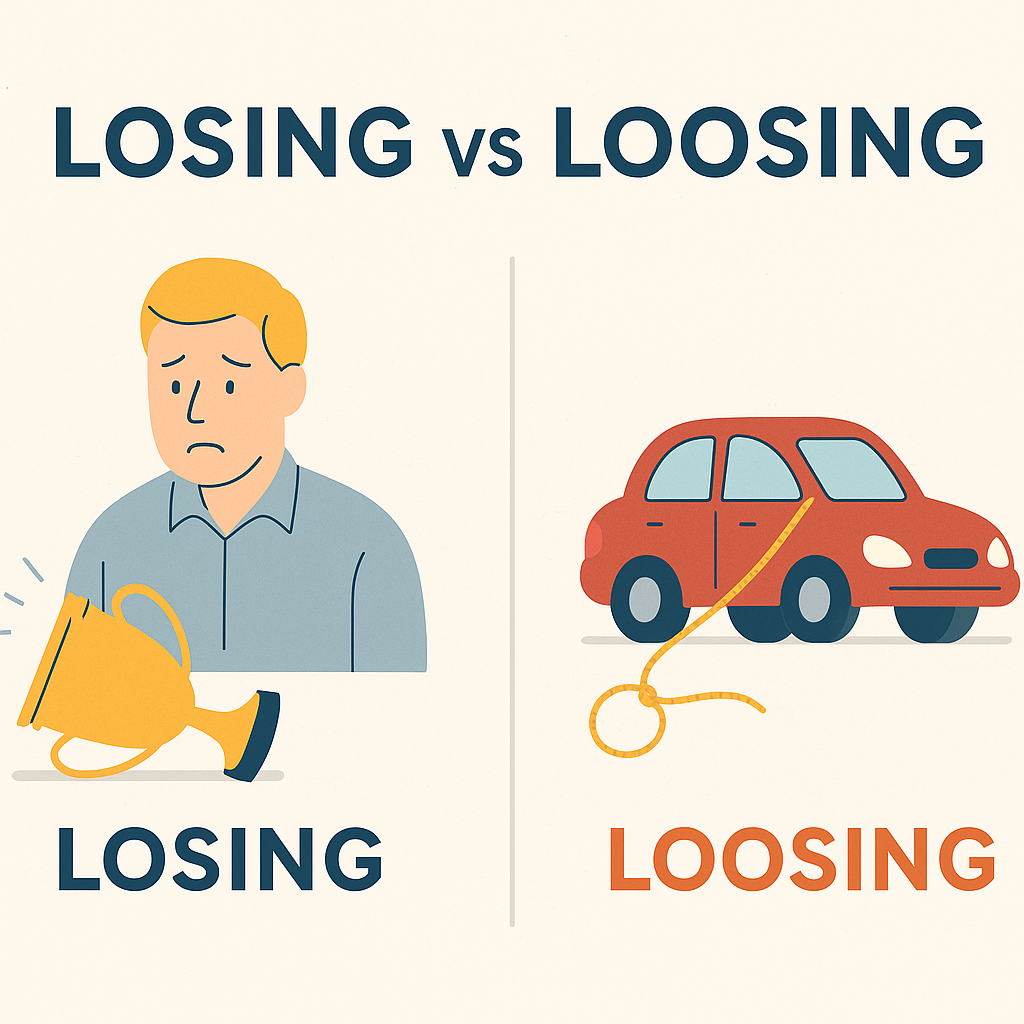Losing vs Loosing

If you’ve ever typed too fast and ended up confusing losing vs loosing, you’re not alone. These two words may look similar, but their meanings and usage are entirely different. In fact, misusing them can drastically change the meaning of your sentence even making it incorrect or confusing.
- Losing refers to the act of not winning or no longer having something.
- Loosing means to release or untighten something.
The extra “o” in loosing might seem like a small detail, but it carries a totally different meaning. In this article, we’ll walk through the grammar, show real-world examples, highlight common mistakes, and offer memory tips to help you master the difference between losing vs loosing.
Grammatical Explanation
Let’s break down the grammar of losing vs loosing:
- Losing is the present participle of the verb “lose.”
It’s used to describe an ongoing action or state of not winning, misplacing something, or failing to keep something.
Example: She is losing her patience. - Loosing is the present participle of the verb “loose.”
It means to make something loose or to release it.
Example: The knight is loosing arrows at the enemy.
Losing is far more common in everyday conversation and writing, while loosing is typically used in specific contexts like archery, restraints, or metaphors about freedom.
When comparing losing vs loosing, pay attention to intent. Are you talking about a loss or a release? That’s the key to choosing the right word.
Real-Life Examples of losing vs loosing
Here’s how losing and loosing look in real-life usage:
Losing (from “lose”):
- He’s losing interest in the project.
- The team is losing the match.
- I keep losing my phone.
Loosing (from “loose”):
- They are loosing the dogs from their cages.
- The warrior was loosing arrows from the tower.
- She is loosing control over her emotions.
Incorrect usage:
- He’s loosing his job.
He’s losing his job. - They are losing the horses into the field.
They are loosing the horses into the field.
These examples show how a single “o” can completely change a sentence’s meaning. Always check if you’re writing about misplacing/failing or releasing/untying when deciding between losing vs loosing.
Common Mistakes of losing vs loosing
The most frequent mistake with losing and loosing is simple: using “loosing” as a misspelling of “losing.” Many people mistakenly add the extra “o” out of habit or due to autocorrect.
- I’m loosing my mind!
I’m losing my mind! - She’s loosing weight fast.
She’s losing weight fast.
On the flip side, using losing when you mean to release something also causes confusion:
- The hunter was losing arrows.
The hunter was loosing arrows.
To avoid these errors, slow down and think about the meaning: are you letting go or experiencing a loss? That’ll help you choose correctly.
Memory Tips
Here’s how to remember the difference between losing vs loosing:
Losing = Lose + ing
- It means you no longer have something.
- Think: “If you lose something, you are losing it.”
Loosing = Loose + ing
- It means to let go, untie, or release.
- Think: “You loose a rope; you are loosing it.”
Mnemonic trick:
- “Losing” a game = bad day.
- “Loosing” a dog = opening the gate.
Another tip: Loose has two o’s, and so does loosing both deal with freedom or release, not failure or defeat.
Remember this, and you’ll never confuse losing vs loosing again.
Conclusion
The difference between losing vs loosing comes down to spelling and meaning. Use losing when referring to not winning, misplacing, or failing to keep something. Use loosing when talking about releasing, unfastening, or letting go.
Need help with similar word pairs? Read our article on Lose vs Loss for another common confusion.
For more clarity, check out Merriam-Webster’s definition of “loose” to understand its verb form in context.